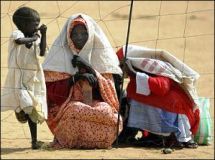Warring sides in Darfur under pressure to reach deal on security issues
ABUJA, Nov 1 (AFP) — African Union mediators pressed Sudan’s government and Darfur rebel leaders to agree on a joint position on security in the strife-torn western region, during talks aimed at reaching an overall deal to end the 20-month civil war.

|
|
Sudanese refugees rest near a fence at the Abu Shouk refugee camp. |
The delegations were presented with a new plan to resolve security issues that have stalled talks on a peace deal since the negotiations resumed in the Nigerian capital on October 21.
“We presented the best compromise possible and now we are waiting for their reaction,” said a senior African Union official following the one-hour meeting.
“The international community is unanimous and has called on the government and rebel delegations to accept this deal in order to move the negotiations forward.”
The two sides are seeking to thrash out a political settlement to a brutal conflict which has driven 1.5 million people from their homes and left tens of thousands dead.
But last week, political discussions reached a stalemate followed disagreements on security issues, with the two sides accusing each other of violations of an April 2004 ceasefire deal.
The new proposal follows one presented on Thursday but to which delegates had proposed a number of amendments during talks with AU mediators.
The differences between the two parties include the disarmament of pro-government Arab Janjaweed militias, cantonment of the rebels, the possibility of turning Darfur into a no-fly zone for military aircraft, and security guarantees for the return of refugees.
“We have listened to the proposal of the AU about security and to the advice of the international community,” said Mahgoub Hussain, spokesman for the Sudan Liberation Movement.
“This proposal seems better than before, and it includes the fact that Darfur should be a no-fly zone. We will keep discussing tomorrow, and I reserve my position because I have to discuss with my people. All international observers are supporting this new proposal in order to move forward in the negotiations.”
A no-fly zone has been one of the main demands of the SLM and the other rebel group, the Justice and Equality Movement (JEM), in order to stop Sudanese military bombardments.
An independent observer at the meeting said the new proposals include a “ban on undertaking hostile military flights to and in the Darfur region.”
“We are going to study the new draft protocol and then, maybe tomorrow, give our impressions,” said the JEM’s chief negotiator, Mohammed Ahmed Tugod.
Late on Sunday the future of the talks as a whole had hung in the balance when the second rebel movement involved in the talks, the Sudan Liberation Movement (SLM), accused the government of bombing a village in northern Darfur.
The group threatened to walk out over Saturday’s alleged airstrike, which Adam said had killed several civilians, and called for the international community to step up pressure on Khartoum.
Earlier on Monday, government spokesman Ibrahim Mohammed branded the allegation “spurious”, accused the SLM of political grandstanding and insisted that there had been no government ceasefire breaches in more than two months.
Niang also downplayed the allegation and an AU official, who said he had spoken late Sunday to the commander of the embryonic AU truce-monitoring force in Darfur, said the unit had heard of no such attack.
Darfur’s rebels allege that the Arab-led regime in Khartoum has marginalised and persecuted their region’s black African communities and are demanding autonomy and a greater share in Sudan’s oil wealth.
